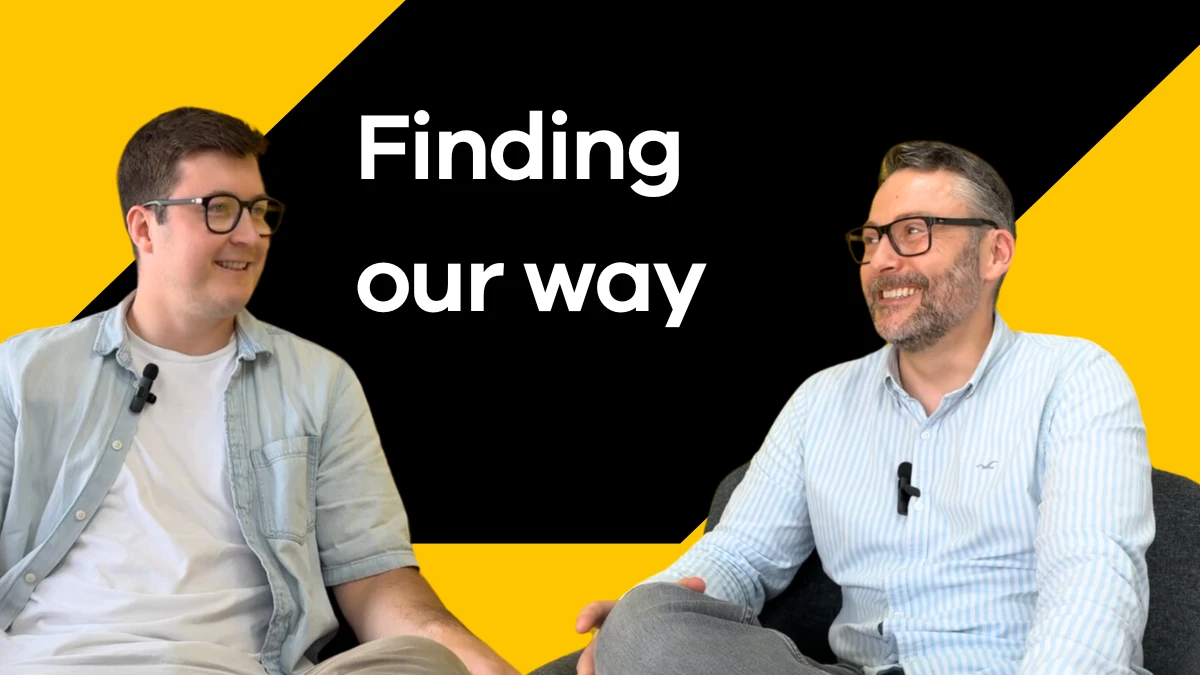
Eyeweb
Unplugged:
Is Imposter Syndrome Sus? | Episode 3 | Eyeweb Unplugged
In this episode, we talked about something a bit more personal. Impostor syndrome. That feeling that you’re not quite good enough, even when all evidence says otherwise. It’s something that comes up a lot, particularly in marketing and creative industries, where success is often subjective and feedback can be inconsistent.
We explored why it shows up, how it feels, and why it might never fully go away. But more importantly, we looked at how to manage it and even use it to your advantage.
About the episode
It’s More Common Than You Think
The first question we asked was simple. When was the last time you felt impostor syndrome? The answer was, quite honestly, just a few minutes ago. It’s that common. For some, it’s fleeting. For others, it’s more of a constant presence in the background, occasionally shouting a bit louder than usual.
What’s clear is that nobody is immune. No matter how experienced you are or how confident you might seem from the outside, impostor syndrome still finds a way in. And weirdly, that can be reassuring. Because if everyone has it, then maybe it’s not a sign of failure at all.
A Shift in Business Culture
Ten or twenty years ago, admitting you didn’t know something in the workplace wasn’t really an option. There was a lot of saving face. You were expected to just get on with it and not show any cracks. But things have changed. More people are open about not having all the answers, and there’s a growing awareness that asking questions is a strength, not a weakness.
Leaders who create space for honesty and learning tend to get better results from their teams. When people feel safe to say, “I’m not sure, can you help?” they’re much more likely to grow in confidence.
The Problem with Subjectivity
Marketing is a field full of grey areas. What one person thinks is great, someone else might completely disagree with. You can spend hours crafting content you’re proud of, only to have it fall flat online. Then a quick, throwaway post ends up with ten times the engagement.
This inconsistency makes it easy to doubt yourself. And it’s not just the performance of the content. Sometimes you’ll be presenting ideas to people you really admire or respect, and that can be intimidating. Especially when you’re still finding your voice or developing your own style.
Social Media Doesn’t Help
We all know we’re not supposed to chase likes, but let’s be honest, most of us still do. Whether it’s a new blog post, a LinkedIn update, or a TikTok video, we find ourselves checking the numbers and hoping they validate the work.
It’s one of the strange contradictions in our industry. We spend our time telling clients not to obsess over vanity metrics, while doing exactly that behind the scenes. Even knowing that metrics don’t always reflect value, we still crave that little boost of approval.
Support Makes a Huge Difference
One of the most important ways to manage impostor syndrome is having people around you who understand what it feels like. When you work in an environment where feedback is honest, constructive and kind, it’s much easier to grow.
If mistakes are treated as part of the process, rather than failures, people become more willing to take risks and try new things. And if you know someone’s got your back, even when things don’t land, it becomes a lot easier to speak up, share ideas and take ownership.
Nobody’s Really Watching
It sounds a bit bleak, but it’s actually comforting once you realise it. Most people are not paying that much attention to what you’re doing. They’re busy with their own projects, their own goals, their own worries. That post you were nervous about? Most people probably scrolled past it.
The fear of being judged often holds us back more than the reality. Once you stop assuming everyone is watching and waiting to critique, you give yourself permission to try without fear.
Validation Matters More Than We Admit
We like to think we’re above it, but everyone needs validation sometimes. Especially when you’re working hard and second-guessing whether it’s good enough. That’s where a supportive team and a healthy workplace culture come in.
Mentors are important too. When you’re figuring things out as you go, it makes a big difference to hear someone say, “Yes, that’s the right approach,” or, “I’d have done the same thing.” Those moments build confidence and help ease the constant questioning.
Final Thoughts
Impostor syndrome might never fully go away. But that doesn’t mean you can’t manage it, or even learn something from it. Often, it’s a sign that you care about doing a good job. That you want to grow. That you’re aware of how much there is still to learn.
And in a world that changes as fast as ours does, that’s not a weakness. It’s exactly the mindset that will keep you moving forward.
Finding Our Way | Episode 4 | Eyeweb Unplugged
In this episode, we chatted about how lots of people in marketing didn’t start there. Our paths in were far from traditional, but that’s often what makes them work. Whether it was psychology, design, gaming or just a fascination with how people think, we explored how different backgrounds can shape a successful marketing career and why curiosity is often more important than qualifications.



